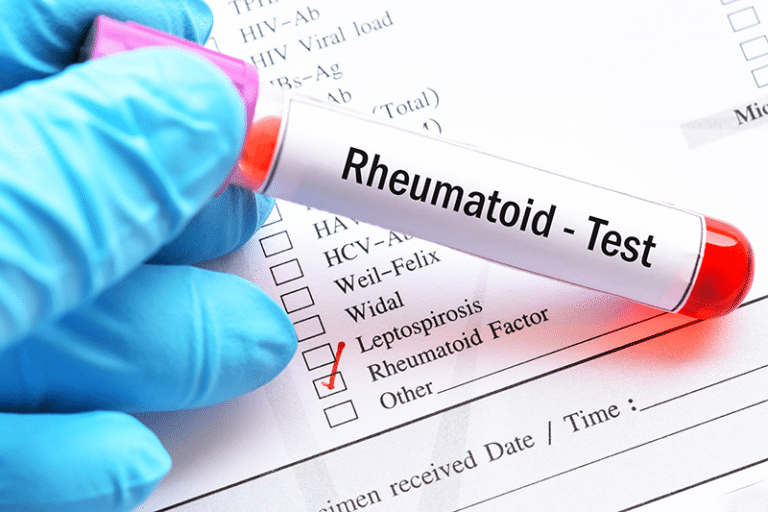Rheumatoid factor (RF) is a vital antibody linked to rheumatoid arthritis and other autoimmune diseases. It helps in diagnosing these conditions, making it essential for both patients and doctors to understand.
If you or someone you know is experiencing symptoms of rheumatoid arthritis or other autoimmune diseases, such as joint pain, stiffness, swelling, fatigue, or fever, don’t wait to get tested. Contact Momentum Medical today and schedule an appointment with one of our experienced rheumatologists.
Momentum Medical offers comprehensive care and treatment options for patients with rheumatoid arthritis using the latest technology and research. Don’t let your condition worsen or affect your quality of life.
Call us now and take the first step towards a healthier future.
What is the Rheumatoid Factor (Rf) Test?
Rheumatoid factor (RF) is a protein made by your immune system. It can attach to other antibodies in your blood. Testing for RF helps doctors figure out what might be wrong.
Doctors use a blood test to find RF. If they see high levels, it could mean you have an autoimmune disease. This doesn’t just point to rheumatoid arthritis. Other diseases show up too.
What Is Rheumatoid Factor Used For?
Differentiating Arthritis
- Arthritis has many forms. Getting an RF test can help medical experts pinpoint what kind of arthritis their patients have.
- Early detection through the RF test can significantly impact patient outcomes. It allows healthcare providers to start appropriate interventions sooner, potentially slowing disease progression.
Early Detection
- Detecting autoimmune disorders early is another critical benefit of the RF test. Autoimmune conditions, where the body’s immune system attacks its tissues, can be debilitating if not diagnosed promptly.
The specificity of the RF test helps in this early diagnosis. Although not every person with high RF levels will have an autoimmune disorder like RA, a positive result often leads to further testing for an accurate diagnosis.
Guiding Treatment
Under some circumstances, elevated rheumatoid factor levels—found via an RF test—are important markers of disease activity. Healthcare providers can use this information to determine the appropriate level of aggression for a treatment plan, which directly influences treatment decisions.
Using RF test insights in conjunction with other diagnostic information, medical practitioners can develop customized treatment regimens for every patient. This guarantees that the care given is specially designed to address the patient’s particular needs and condition, thereby optimizing their course of treatment.
How the Test is Performed
- Blood Collection
A blood sample is essential for the test. It’s taken from a vein in your arm. The process is simple and quick.
- Lab Analysis
The collected blood goes to standard labs for analysis. No special equipment is needed for this test.
In these labs, technicians measure rheumatoid factor levels using precise laboratory tests. They follow strict protocols to ensure the accuracy of the results.
- Results Timeline
Expect results within a few days of the test. This quick turnaround helps in timely decision-making regarding treatment options.
Once available, your doctor will discuss the results with you. They’ll explain what they mean for your condition and the next steps, if necessary.
Pros of RF Test:
- Simple procedure
- Quick results
- Performed in standard labs
Cons of RF Test:
- Requires blood draw
- Minor discomfort during collection
Knowing what happens before, during, and after can ease concerns about undergoing this crucial diagnostic step.
How to Prepare for the Test
To prepare for the test, you don’t need to do anything special. No fasting is necessary before undergoing an RF test. This fact can ease patients’ concerns since they don’t need to alter their diet or skip meals.
However, staying hydrated is important. Drinking plenty of water before the test helps make the vein more visible and blood drawing easier.
Informing your doctor about all medications being taken is also important. Some medicines might affect the rheumatoid factor levels in your blood.
Before The Test
Wearing loose clothing—especially sleeves that can be easily rolled up to reveal your arm—may be advantageous on the day of the test.
There’s no need for extensive preparation at home if you opt for a lab visit. For those considering home RF tests, ensure you have all components ready: test kit, instructions, and a clean surface.
Home testing offers convenience but requires careful handling of materials like test tubes and samples. Follow instructions meticulously to avoid contamination or errors in the results.
The process involves pricking your finger to collect a blood sample, which then goes into a test tube or on a strip provided in the kit. It usually takes just a few minutes to complete with minimal discomfort.
After collecting your sample, whether at home or in a laboratory setting, questions about smoking habits may arise, as they could influence RF levels. Understanding the reference ranges provided with RF results helps interpret whether one’s readings fall within normal limits or indicate risk factors associated with conditions like rheumatoid arthritis.
Momentum Medical: Your Partner in Understanding and Managing Rheumatoid Arthritis
You’ve just taken a crucial step towards understanding rheumatoid arthritis and the role of the RF test. While learning about the test is valuable, remember – early diagnosis and proper management are key to living well with autoimmune diseases.
Momentum Medical is here to empower you on that journey. Our experienced rheumatologists offer:
- Comprehensive consultations: We delve deep into your medical history, symptoms, and RF test results to build a personalized diagnosis and treatment plan.
- Cutting-edge treatment options: We leverage the latest advancements in medication, therapy, and other approaches to manage your condition effectively.
- Compassionate care: We understand your challenges and provide empathetic support throughout your treatment journey.
Don’t wait for your condition to worsen. Take action today!
Schedule an appointment today. Together, we can help you thrive despite your diagnosis. Contact Momentum Medical and take control of your health!
FAQs
What are the Rheumatoid Factor normal results?
Rheumatoid factor’s “normal” range varies slightly depending on the lab, but in general, it is thought to be as follows:
- Less than 14 IU/ml1
- Less than 20 units per milliliter (<20 U/mL)2
- 0 to 20 IU/ml3
What does a high level of rheumatoid factor mean?
Rheumatoid factor elevations are frequently indicative of an autoimmune disease. Rheumatoid arthritis is a common condition associated with high RF. However, it’s not the only possibility. Several disorders can cause an increase in RF levels. These include lupus and Sjogren’s syndrome, among others.
How can I reduce my rheumatoid factor?
Following a doctor’s advice and undergoing treatment can be a way to reduce the level of rheumatoid factor in your blood.
It is best to speak with a doctor if you experience any symptoms that indicate changes in your RF because they can identify the underlying illness affecting you. Get an RF test as soon as possible to find out what treatments are necessary and to prevent further issues in your system.

